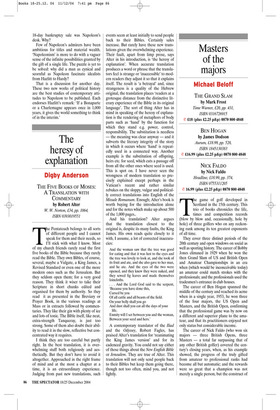The heresy of explanation
Digby Anderson
THE FIVE BOOKS OF MOSES: A TRANSLATION WITH COMMENTARY by Robert Alter W. W. Norton, £34, pp. 1064, ISBN 0393019551 The Pentateuch belongs to all sorts of different people and I cannot speak for them and their needs, so I’ll stick with what I know. Most of my church friends rarely read the first five books of the Bible because they rarely read the Bible. They own Bibles, of course, several, maybe a Vulgate, a King James, a Revised Standard or even one of the more modern ones such as the Jerusalem. But they seldom open them; for a very good reason. They think it wiser to take their Scripture in short chunks edited and organised for them by authority. So they read it as presented in the Breviary or Prayer Book, in the various readings at Mass or in extracts followed by commentaries. They like their gin with plenty of ice and lots of tonic. The Bible itself, like neat, extra-strength Tanqueray, is just too strong. Some of them also doubt their ability to read it in the slow, reflective but concentrated way it requires.
I think they are too careful but partly right. In the best translation, it is overwhelming stuff both religiously and aesthetically. But they don’t have to avoid it altogether. Approached in the right frame of mind and at the most a chapter at a time, it is an extraordinary experience. Judging from past new translations, such events seem at least initially to send people back to their Bibles. Certainly sales increase. But rarely have these new translations given the overwhelming experience. Their fault, apart from limp prose, says Alter in his introduction, is ‘the heresy of explanation’. When accurate translation produces a word or phrase that the translators feel is strange or ‘inaccessible’ to modern readers they adjust it so that it explains itself. The result is ‘a betrayal’ and, since strangeness is a quality of the Hebrew original, the translation places ‘readers at a grotesque distance from the distinctive literary experience of the Bible in its original language’. The sort of thing Alter has in mind in speaking of the heresy of explanation is the rendering of metaphors of body parts such as ‘hand’ by the function for which they stand e.g. power, control, responsibility. The substitution is needless — the meaning was clear anyway — and it subverts the literary integrity of the story in which it occurs where ‘hand’ is repeatedly used in a connected way. Another example is the substitution of offspring, heirs etc. for seed, which cuts a passage off from all the other ones where seed is used. This is spot on. I have never seen the wrongness of modern translation so precisely explained except perhaps in the Vatican’s recent and rather similar rebukes on the sloppy, vulgar and politically correct translations into English of the Missale Romanum. Enough; Alter’s book is worth buying for the introduction alone and for the notes which make up about 500 of the 1,000 pages..
And his translation? Alter argues that the translation closest to the original is, despite its many faults, the King James. His own reads quite closely to it with, I assume, a lot of corrected inaccuracies:
And the woman saw that the tree was good for eating and that it was lust to the eyes and the tree was lovely to look at, and she took of its fruit and ate, and she also gave to her man, and he ate. And the eyes of the two were opened, and they knew they were naked, and they sewed fig leaves and made themselves loincloths.
. . . And the Lord God said to the serpent, ‘Because you have done this, Cursed be you Of all cattle and all beasts of the field.
On your belly shall you go And dust shall you eat all the days of your life.
Enmity will I set between you and the woman, Between your seed and hers.’
A contemporary translator of the Iliad and the Odyssey, Robert Fagles, has praised Alter’s translation for ‘reanimating the King James version’ and for its cadenced gravity. You could not say either of those things about the New English Bible or Jerusalem. They are true of Alter. This translation will not only send people back to their Bibles but keep them going there, though not too often, mind you, and not lightly.

















































































 Previous page
Previous page